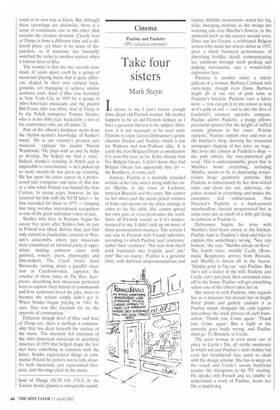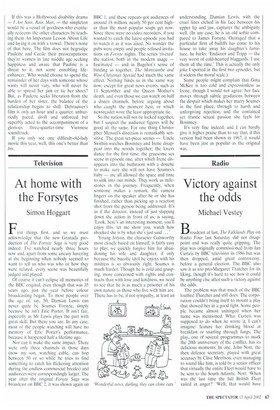Cinema
Pauline and Paulette (PG, selected cinemas)
Take four sisters
Mark Steyn
It occurs to me I don't review enough films about old Flemish women. My mother happens to be an old Flemish woman, so I have a personal interest in the subject. However, it is not necessary to be even semiFlemish to enjoy Lieven Debrauwer's gentle charmer Pauline and Paulette, which is fun for Walloon and non-Walloon alike. It is easily the best Belgian-Dutch co-production I've seen this year, so far. It has already won five Belgian Oscars. I didn't know they had Belgian Oscars but apparently they do — the Knokkers, or some such.
Anyway, Pauline is a mentally retarded woman in her late sixties living with her sister Martha in the town of Lochristi, between Brussels and the coast. She cannot tie her shoes and she needs pencil outlines of forks and spoons on the place settings in order to lay the table. She cannot spread her own jam, or even pronounce the word. Since all Flemish sounds as if it's mispronounced to me. I didn't pick up on many of these pronunciation nuances. The version I saw was in Flemish with French sub-titles, according to which Pauline said `confeture' rather than `confiture". Not sure how this'll work translated into English: jem? jim? join? But no matter. Pauline is a geriatric child, with habitual mispronunciations and
clumsy childlike movements: watch her big, wide, sweeping motions as she swings her watering can over Martha's flowers, or the awkward lurch as she careers around town. Dora van der Groen, a celebrated Belgian actress who made her screen debut in 1955, gives a finely balanced performance of absorbing birdlike detail, communicating her emotions through small pecking and gulping movements, and a wonderfully expressive face.
Paulette is another sister, a stately galleon of a woman, Barbara Cartland writ extra-large, though even Dame Barbara might jib at the riot of pink satin in Paulette's boudoir. Paulette runs a fabric store — you can get it in any colour as long as it's pink or red — and is also the diva of Lochristi's amateur operetta company. Pauline adores Paulette, a pudgy pillowy provincial spinster but the height of ruffled rosette glamour to her sister. `Polette opelette,' Pauline repeats over and over in the butcher's shop, showing her treasured newspaper clipping of her sister on stage. She loves the colours in Paulette's shop — the pink fabrics, the rose-patterned gift wrap. This is understandable, given that in Martha's home everything, including Martha, seems to be in depressing seniorcitizen beige geometric patterns. But Paulette is embarrassed by her slow-witted sister and shoos her out: otherwise, she pokes around in everything and makes the customers feel embarrassed. Ann Petersen's Paulette is a hard-centred marshmallow, fiercely proprietorial but in some ways just as much of a little girl living in isolation as Pauline is.
Debrauwer begins his story with Martha's fatal heart attack in the kitchen. Pauline runs to Paulette's shop and tries to explain that something's wrong. 'Nice cup broken,' she says. 'Martha asleep on floor.' The fourth sister, worldly Cecile (Rosemarie Bergmans), arrives from Brussels, and Martha is driven off in the hearse. 'Martha gone in big car,' says Pauline. But she's left a kicker in the will: Paulette and Cecile can't just pack their unwanted sister off to the home: Pauline will get everything unless one of the others takes her in.
She moves in with Paulette, who regards her as a nuisance but dresses her in bright floral prints and gamely endures it as Pauline stands alongside the cash register and echoes the stock phrases of each transaction. 'Thank you. Come again.' Thank you. Come again.' But a night at the operetta goes badly wrong, and Pauline must go. To Brussels, to Cecile.
The poor woman is even more out of' place in Cecile's flat, all sterile modernity in which not just Pauline's drab clothes but even her bewildered face seem to clash with the design scheme. She has to sleep on the couch and Cecile's snooty boyfriend resents the disruption to his TV viewing. He speaks only French and so, unable to understand a word of Pauline, treats her like a stupid dog. If this was a Hollywood disability drama — I Am Sam, Rain Man, — the simpleton would be a vessel of goodness who eventually redeems the other characters by teaching them An Important Lesson About Life and laying it on with a trowel. There's none of that here. The film does not begrudge Paulette and Cecile their preoccupations: they're women in late middle age seeking happiness and aware that Pauline is a threat to it, not some ennobling lifeenhancer. Who would choose to spend the remainder of her days with someone whose wants will never vary, who will never be able to spread her jam or tie her shoes? But, as Paulette seeks liberation from the burden of her sister, the balance of the relationship begins to shift. Debrauwer's film is only an hour and a quarter, unhurriedly paced, droll and unforced but superbly acted to the accompaniment of a glorious three-quarter-time Viennese soundtrack.
If you only see one difficult-old-lady movie this year, well, this one's better than Iris.



















































































 Previous page
Previous page